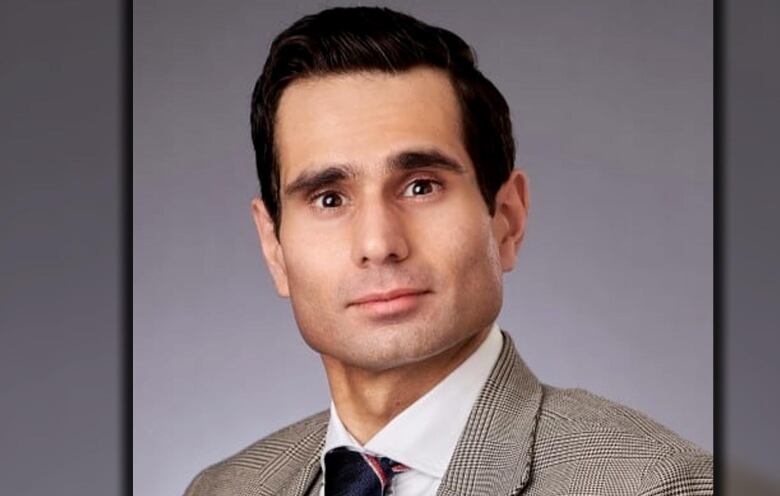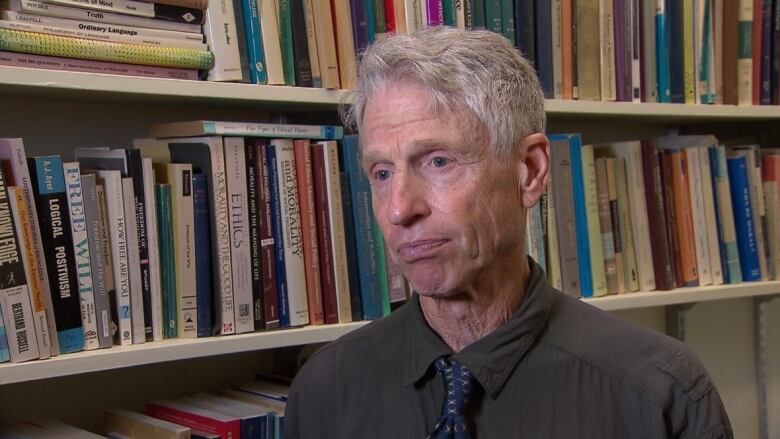Ethics expert slams U of Manitoba for lack of legal action against law dean accused of misspending
Fear of 'public scrutiny' possible factor in Jonathan Black-Branch decision: ethics centre founding director

An ethics expert at the University of Manitoba says he's angry the post-secondary institutionhasn't pursued legal action to recoup about half a million dollars a former law dean allegedly misspent most of which wasmeant for students.
It "makes one's blood boil"that the universitydidn't take legal action against Jonathan Black-Branch, said Prof. Arthur Schafer.
"Their failure to be accountable to any extent irresistibly raises the suspicion that they're afraid of any public hearing and about what it will reveal about the university [and]its procedures," said Schafer, who is the founding director of the U of M'sCentre for Professional and Applied Ethics.
A civil lawsuit or criminal investigation would expose the university to "public scrutiny" of how administrators handled the money troubles, he notes.
Black-Branch suddenly went on leave in May 2020. A whistleblower complaint led to aninternal investigation by the U of M around the same time, which found that summer that a senior university employee misspent university funds.
The university didn't publicly name Black-Branch at the time, but filed a complaint with the law society in 2020.
A Law Society of Manitoba's disciplinary panel is now deliberating over whether to suspend, reprimand, disbar or clear Black-Branch after he allegedly misspent about $500,000 during his time as dean, most of it from a U of M endowment fund he oversaw that was earmarked for student development.
In a statement, the university said it decided not to pursue legal action "after a thorough assessment of its options," instead opting to file the law society complaint.
Winnipeg police said they didn't investigate and no report was ever made to the financial crimes unit.
Grad disappointedby university response
A U of M law school graduate who was a student research assistant of Black-Branch's in 2019 says he's disappointed his alma mater isn't doing more to hold the former dean to account.
"You can walk and chew gum at the same time, and they seem to have just been content with kind of putting all the work onto someone else the law societyto produce justice rather than pursuing him themselves," said Adam Lakusta, now an intellectual property lawyer in Alberta.

Lakustasaid he doesn't "hold [Black-Branch] in any sort of respect anymore."
"For him to lecture everyone on integrity and honesty in the profession seems beyond hypocritical," he said.
The law society alleges Black-Branch misspent $472,000for his own professional development courses at Ivy League schools, misrepresenting circumstances around thousands of dollars worth of meals expensed to the university, and manipulating internal processes to have the U of M pay $75,000 to a foundation he was president of.
The university says it took "steps to recoup the funds" but failed. A university spokesperson refused to elaborate on what those steps included.
A source in the law faculty told CBC they advised U of M administration to put a lien or lis pendens a notice of pending legal action on a property owned by Black-Branch that was put up for sale in 2020.
That would allow theuniversity to tryto recoup some of what Black-Branch was alleged to have misspent, but it doesn't appear to have happened.
"We need to know why they didn't do that," said Schafer.
City of Winnipeg municipal tax records list Jonathan Black-Branch as the owner of a Tuxedo home as of June 2020 that was valued at $684,000. Another assessment record suggests the home was purchased by new owners by June of 2021.
A land titles search suggests the property changed hands in August 2020 for over $800,000. There was no indication on that document or the most recent land title of any liens placed on the property.
Questions over 'internal controls'
The university says it strengthened "internal controls" in 2021, including a requirement that all deans' expenses be summarized quarterly for review by the U of M chief financial officer and comptroller.
Winnipeg tax lawyer Suraj Lakhi, a recent graduate who attended U of M law during Black-Branch's tenure, supports implementing "proper safeguards for the future," but questioned why those weren't there in the first place.
"Corporate entities have these failsafes in place, but when you come to a public institution, like a government-funded university, it's not there? It should be," he said.
Students and the university "are ultimately the victims here," said Lakhi.

The U of M said it followed proper procedures by informing the Office of the Auditor General and the appropriate provincial minister at the time of its investigation.
Auditor General Tyson Shtykalo said his office reviewed results of the U of M's "due diligence" and internal audits. He decided against conducting a full investigation and would not share details of his preliminary review with CBC.
Advanced Education Minister Rene Cable said she is confident the university makes "appropriate legal decisions" in the best interest of the school, students and taxpayers.
The provincial government supports the U of M's"focus on making sure that this never happens again with very clear rules, robust policies, and staff training," shesaid in a statement.
'The worst kind of betrayal'
But Schafer said the U of M "has a duty to the entire university community and to the general public to recover money allegedly stolen, and a duty to protect the public by reporting possible criminal wrongdoing."
"The administration seems not to recognize that it's accountable both to the university and to the wider community. It's morally obliged to explain and justify its questionable decisions."

Andrea Hilland, an assistant professor in the Peter A. Allard School of Law at University of British Columbia, said lawyers in leadership positions should be "role models for ethical behaviour."
They swear oaths to abide by a code of professional conduct and to conduct themselves "honestly and with integrity," so the actions Black-Branch is accused of wouldconstitute"a serious ethical breach," she said in a statement.
"Fraud by a lawyer undermines public confidence in the administration of justice, and decreases the public's perception of the reputation of the profession."
Lakusta said his classmates have been thinking back on how Black-Branch used to repeatedly say, "Your reputation is everything."
"When he disappeared," no one thought "he had somehow betrayed the law school or his oath as a lawyer,"said Lakusta.
"It just felt like the worst kind of betrayal."
CBC News did not hear back from Black-Branch or his lawyer before publication.












_(720p).jpg)


 OFFICIAL HD MUSIC VIDEO.jpg)
.jpg)



























































































